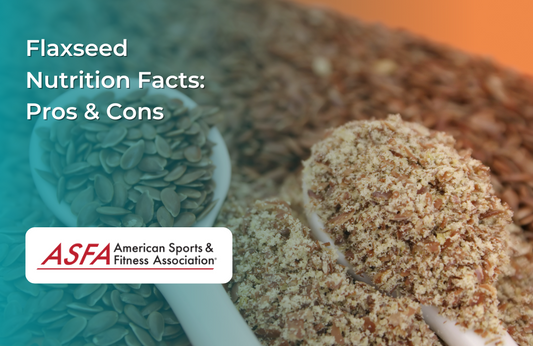Flaxseeds are a nutrient-dense superfood known for their high fiber, omega-3 fatty acids, and plant-based protein. They provide numerous health benefits, particularly for heart health, digestion, and hormone balance. However, their digestibility and potential side effects should be considered. Understanding the pros and cons of flaxseeds helps in making informed dietary choices.
Flaxseed Nutrition Facts: Pros and Cons of Eating Flaxseeds
Nutritional Profile of Flaxseed
Flaxseed is a powerhouse of essential nutrients, making it a valuable addition to any diet. Just one tablespoon (7 grams) of ground flaxseed packs a significant nutritional punch, providing:
-
2 grams of fiber: This accounts for around 5% and 8% of the daily recommended intake for men and women, respectively, supporting digestive health and promoting satiety.
-
1.8 grams of protein: A great source of plant-based protein, essential for muscle repair and growth.
-
1.8 grams of omega-3 fatty acids: Including alpha-linolenic acid (ALA), which supports heart health and reduces inflammation.
-
0.5 grams of polyunsaturated fatty acids: Beneficial for maintaining healthy cholesterol levels.
-
0.3 grams of monounsaturated fatty acids: Known for their heart-protective properties.
-
0.1 grams of saturated fatty acids: Present in minimal amounts, making flaxseed a heart-healthy choice.
-
10-15% of the daily recommended intake of vitamin B1 (thiamin): Vital for energy metabolism and nerve function.
-
10-15% of the daily recommended intake of magnesium: Important for muscle and nerve function, as well as bone health.
-
5-10% of the daily recommended intake of selenium: An antioxidant that helps protect cells from damage.
-
5-10% of the daily recommended intake of iron: Essential for oxygen transport in the blood.
Additionally, flaxseed is rich in antioxidants, including lignans and phenolic acids, which have anti-inflammatory and anti-cancer properties. Incorporating ground flaxseed into your diet can provide these essential nutrients and support overall health.
Rich in Omega-3 Fatty Acids (ALA)
Flaxseeds are one of the best plant-based sources of omega-3s, specifically alpha-linolenic acid (ALA), which:
-
Supports heart health by reducing inflammation and lowering bad cholesterol (LDL).
-
Promotes brain function and reduces the risk of neurodegenerative diseases.
High in Dietary Fiber for Digestive Health
Flaxseeds contain both soluble and insoluble fiber, which:
-
Supports gut health and regular bowel movements.
-
Helps with weight management by promoting satiety.
-
Aids in blood sugar control by slowing glucose absorption.
Soluble fiber in flaxseeds also helps lower cholesterol levels, making it a key ingredient for those seeking a healthier lifestyle.
Good Source of Plant-Based Protein
Flaxseeds provide high-quality plant-based protein, making them a great addition to vegetarian and vegan diets.
Supports Heart Health
The omega-3s, fiber, and lignans in flaxseeds contribute to:
-
Lower cholesterol levels.
-
Reduced risk of high blood pressure and heart disease.
Studies have shown that flaxseed can help lower blood pressure, leading to significant health improvements.
Contains Lignans, Which Support Hormone Balance
Flaxseeds are one of the richest sources of lignans, plant compounds that:
-
Act as phytoestrogens, helping balance hormone levels.
-
May reduce the risk of hormone-related cancers, such as breast and prostate cancer.
May Help Regulate Blood Sugar Levels
Flaxseeds have a low glycemic index and fiber content that helps stabilize blood sugar levels, making them beneficial for individuals managing diabetes. Proper flaxseed consumption, such as grinding the seeds, enhances nutrient absorption and plays a crucial role in a balanced diet.
Maximizing the Benefits of Flaxseed
To fully harness the health benefits of flaxseed, it’s best to consume it in its ground form. Ground flaxseed allows for better absorption of its nutrients, making it more effective in promoting health. Here are some tips to maximize the benefits of flaxseed:
-
Incorporate into Meals: Add ground flaxseed to oatmeal, yogurt, smoothies, and baked goods. This not only boosts the nutritional content but also enhances the flavor and texture of your meals.
-
Flaxseed Oil: While flaxseed oil is a rich source of omega-3 fatty acids, it lacks the fiber and antioxidants found in ground flaxseed. Use it as a supplement but rely on ground flaxseed for a more comprehensive nutritional profile.
-
Complementary and Integrative Health: Flaxseed can be part of a complementary and integrative health approach. It supports digestive health, helps reduce blood pressure, and lowers the risk of chronic diseases such as heart disease, breast cancer, and prostate cancer.
-
Daily Intake: Aim to consume 1-2 tablespoons of ground flaxseed per day. Mixing it with foods and liquids can enhance nutrient absorption.
-
Quality Matters: Choose high-quality flaxseed products that are rich in omega-3 fatty acids and antioxidants to ensure you get the most benefits.
-
Consult Healthcare Providers: Before using flaxseed as a dietary supplement, especially if you have underlying health conditions or are taking medications, consult with a healthcare provider.
By incorporating ground flaxseed into your daily diet and following these tips, you can support overall health and well-being while reducing the risk of chronic diseases.
Cons of Eating Flaxseeds
Whole Flaxseeds Are Hard to Digest
Whole flaxseeds pass through the digestive system undigested, meaning the body does not fully absorb their nutrients. Ground flaxseeds are better for nutrient absorption.
Can Cause Digestive Discomfort in Excess
Due to their high fiber content, consuming too many flaxseeds at once may cause:
-
Bloating, gas, or diarrhea.
-
Digestive discomfort, especially if not drinking enough water.
Contains Natural Compounds That May Interfere with Nutrient Absorption
Flaxseeds contain phytic acid, which may reduce the absorption of minerals like iron and calcium. Eating flaxseeds in moderation and with a balanced diet minimizes this effect.
May Act as a Natural Blood Thinner
The omega-3s in flaxseeds have blood-thinning properties, which may:
-
Increase bleeding risk for individuals on blood thinners.
-
Require medical consultation before consuming in high amounts.
Can Affect Hormone-Sensitive Conditions
Since flaxseeds contain phytoestrogens, individuals with hormone-sensitive conditions (such as breast cancer) should consult a healthcare provider before consuming large amounts.
Conclusion
Flaxseeds are a nutrient-dense superfood that supports heart health, digestion, and hormone balance due to their fiber, omega-3s, and lignans. However, they should be consumed ground for better absorption, and their high fiber content requires moderation to avoid digestive discomfort. Including flaxseeds in a balanced diet provides numerous health benefits when consumed mindfully.
FAQs
How much flaxseed should I eat per day?
A recommended serving is 1-2 tablespoons per day, which provides fiber, omega-3s, and lignans without digestive discomfort.
Should I eat whole or ground flaxseeds?
Ground flaxseeds are better because the body absorbs their nutrients more efficiently than whole seeds.
Can flaxseeds help with weight loss?
Yes, flaxseeds promote satiety, digestion, and blood sugar control, making them beneficial for weight management. Flaxseed consumption can aid in weight management by promoting satiety and improving blood sugar levels.
Are flaxseeds safe for people with hormone-related conditions?
Flaxseeds contain phytoestrogens, so individuals with hormone-sensitive conditions should consult a healthcare provider before consuming large amounts.
How can I add flaxseeds to my diet?
Flaxseeds can be added to smoothies, oatmeal, yogurt, baked goods, and salads for extra nutrition.





